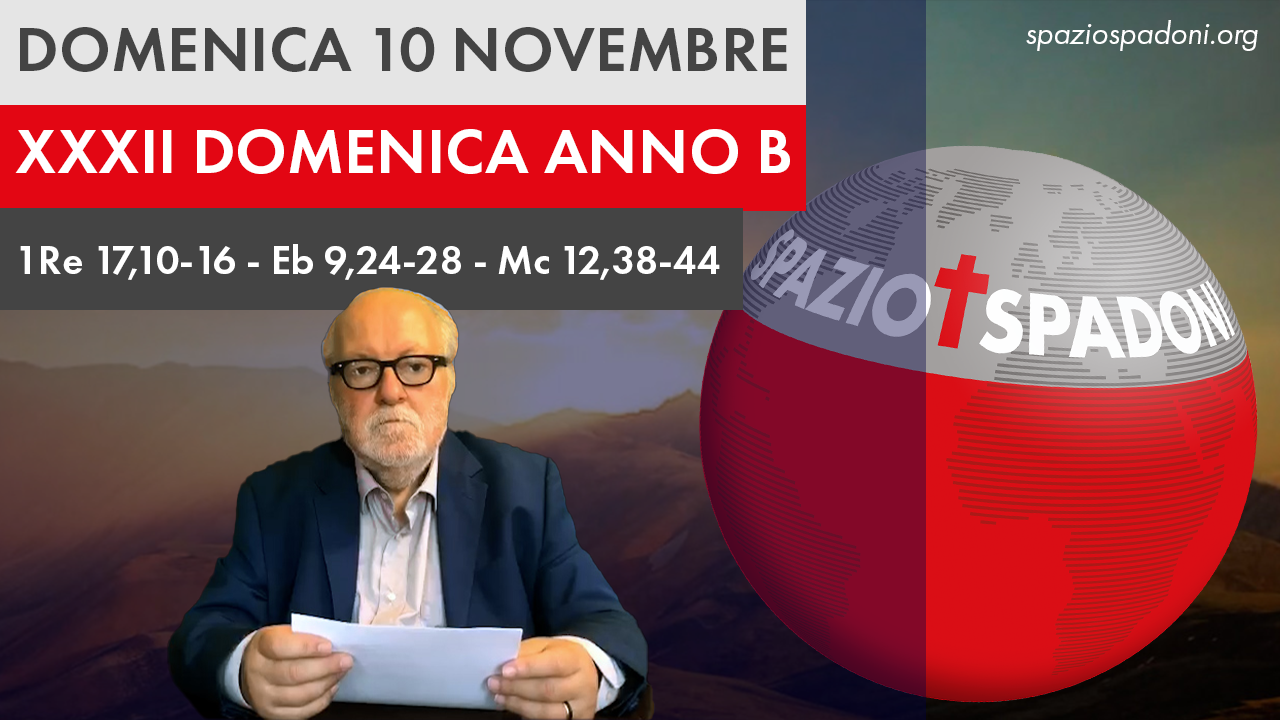
Sunday XXXII Year B – In the school of the poor
Readings: 1 Kings 17:10-16; Heb 9:24-28; Mk 12:38-44
The First Reading (1 Kings 17:10-16) presents us with a poor widow from Zarepta who, in Elijah’s time, gives up all she has for faith in the Word of the Lord. In the Gospel (Mk 12:38-44) Jesus sets as a model for the disciples another poor widow, who offers to God in the Temple “òlon tòn bìon autès” (v. 44), not so much: “all she had to live on,” but literally: “her whole life”!
Poverty is an indispensable condition for giving God “our whole life.” At the same time, poverty is really a sacrament of faith. The abandonment of possessions for those who believe is not to be a voluntaristic choice, a laborious effort of self-perfection: it is the joyful consequence of having discovered the Kingdom of God, with its dynamic of love, fraternal sharing and giving, as a priceless treasure, as a precious pearl for which it is worth giving up everything (Mt 13:44-46). Only those who welcome within themselves the happiness of the Kingdom of God leave everything for it. Sharing with the poor is a sign of having fallen in love with God and, in him and for him, with one’s brothers and sisters.
But today Jesus tells us something even greater: he invites us to take example from the poor. Answering the call to share with the poor apparently seems like a gift given to them. But in reality it is the poor who fill believers with a wealth far deeper and fuller than the wealth they share with them.
“Blessed are you poor, for yours is the Kingdom of God” (Lk 6:20): if the Kingdom of God is of the poor, it is in their school that one must put oneself in order to gain access to it. Let us never forget this mystery: they are the teachers to enter that beatitude that is “theirs.” “The story of the poor seems to be reversed…. The voiceless speak out and question the way of being Christians, of being priests or bishops…. The poor become evangelizers…. “They are the only ones who can speak a word of faith without which the message will remain too incomplete” (E. Grangier)… “It is to the little ones, those who cannot speak or who are not allowed to speak, that the word is given by God, that they may proclaim his kingdom. The folly of the cross is death to the intelligence of the wise, of those who do not understand the word. A reflection on faith that does not pass … through revelation to the poor, goes the wrong way” (G. Gutierrez). And the church of the poor, the most martyred part of the one church, becomes evangelizing and missionary. ‘For poverty is like a great light at the bottom of the heart’ (R.M. Rilke)” (A. Persic).
Monsignor Bello wrote, quoting the pastoral letter of a Bishop of Patagonia, Monsignor Hesayne: “”Desde los pobres a todos,” that is: from the poor to everyone!… It is an act of faith in the unpredictability of our God who, to proclaim and realize his wonders, does not necessarily use chosen troops, churned out by the academy, but makes use of the ragged, the dispossessed, the people who do not count and who are despised. It is precisely these people, this mishmash of the least, who have the task and privilege of proclaiming to the first that salvation is at hand.”
And today more than ever before, to our opulent and sad, super-technological West often lacking in wisdom, the poor remind us of so many values we have lost. Africa teaches us love of nature, life, ancestors, a sense of celebration. Asia and Oceania the search for the absolute of God, inner peace, harmony, gratuitousness. Latin America the concern for the least, the struggle for justice, the sense of community life and sharing. And so many poor even in rich countries are for us teachers of simplicity, of essentiality, of knowing how to enjoy small things, of mutual solidarity.
Only in the school of the poor can we learn to follow the One who made Himself the Poor One par excellence (2 Cor. 8:9), and thus became the only Priest between God and man (Second Reading: Heb. 9:24-28).
